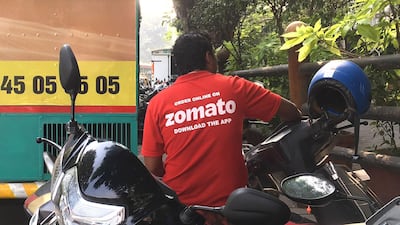The social media gods are smiling benevolently on restaurant discovery and food-delivery app Zomato, which is currently riding on the kind of publicity money can't buy. And it all started with a bizarre, bigoted request by a user.
On Tuesday, July 31, an irate Twitter user named Amit Shukla expressed his displeasure over a non-Hindu driver delivering his food. Shukla was informed he would not receive a refund from the app or the restaurant, and so he cancelled the order.
"You can't force me to take a delivery I don't want, don't refund, just cancel," he wrote on Twitter.
He then, abhorrently, said: "I don't need a delivery from a Muslim fellow."
The incident would probably have gone unnoticed if an enterprising social media executive hadn't chosen to reply to Shukla's tweet.
Shukla told India Today that he didn’t want his food to be handled by a “non-Hindu” person in the holy Hindu month of Saavan. Naturally, his "justification" spawned a fresh torrent of anger — with some asking whether he was next going to ask for personal assurance that his food was being farmed and cooked by Hindus as well. Shukla has since deleted his original Twitter profile, and created a new one using the same handle.
Zomato India’s pithy response to Shukla’s tweet was: “Food doesn’t have a religion. It is a religion.”
This short proclamation has since broken the internet. Some on social media rained praise on Zomato and its founder Deepinder Goyal for “taking a stand against bigotry” and “being on the right side of history”.
Goyal also posted a statement on the incident: “We are proud of the diversity of our esteemed customers and partners. We aren’t sorry to lose any business that comes in the way of our values.” These tweets have garnered almost 50,000 retweets and 150,000 likes so far, with users violently professing their disgust – and rightfully so – at Shukla’s obnoxious demand.
As we said, this is the kind of publicity money can’t buy.
The incident is an example of much that is wrong with India today
As distasteful as the incident was, it is the perfect example of much that is wrong with India in the current political environment. While I see the value in its response, I am a little appalled by the gushing, over-enthusiastic praise being directed at Zomato.
Mostly because I’m hard-pressed to find anything revolutionary about not giving in to a customer’s narrow-minded demands. Is the bar set so low that even baseline decency and the willingness to publicly espouse liberal values is considered an act of extraordinary courage by a company?
The sad truth is, it probably is. Last year, India’s right-wing trolls declared that they would be boycotting Amazon unless brand ambassador actress Swara Bhasker was fired. Why? Because she protested against political support for the rapists of an eight-year-old Muslim girl in the country. It's clear she was on the right side of history.
In 2016, Shah Rukh Khan was branded anti-national when he said in an interview that India was growing increasingly intolerant, and there were calls to boycott Reliance Jio, the brand that he endorsed. The same happened with Aamir Khan and Snapdeal in 2015. In such a volatile environment, it is understandable why companies and their owners might prefer to stay mum in public, no matter what their private beliefs might be. So perhaps it really is audacious of Zomato to put their convictions into words.
However, food does have a religion in India
While I can certainly accept that this tweet was brave on Zomato’s part, it’s tough not to raise a wary eyebrow at the unfortunate choice of words. Food does have a religion, especially in India.
In fact, scarcely a month goes by without news trickling out from some part of the country — usually the northern belt — about someone being lynched or killed over suspicions of cooking, eating, selling or even storing beef. A conservative estimate by Human Rights Watch puts the death toll due to violence over eating beef at 44 between 2015 and 2018. If food didn’t have a religion, restaurants around the country wouldn’t proudly be advertising that the food served by them was “pure” and cooked only by Brahmins.
The ideologies surrounding purity and food run deep. As recently as three years ago, the Supreme Court of India was called upon to rule on the dignity-stripping practice of members of the Dalit community rolling in food leftover by Brahmins. Those of the Dalit caste believed the purity of the Brahmin touch may cure their skin diseases and other ailments.
As a stakeholder in the country’s fraught food ecosystem, Indian-owned company Zomato can’t possibly be ignorant enough to believe that food has no religion. But catchy, re-tweetable one-liners trump measured engagement in the social media economy any day.
Some on social media pointed out that Zomato’s assertion that, for them, “food has no religion” was false: the company notes on its app which restaurants are halal-certified as a courtesy to its Muslim users, but doesn't do so for Hindus. However, it's simply not the same issue: halal doesn't discriminate against a particular person or community, and doesn't require that food be cooked or delivered by a certain individual, only that it is cooked in a certain style.
However, the backlash on the above point was enough that Zomato felt the need to release a statement saying its halal tag was a distinction requested by restaurants to help users make more informed choices, much in the same way as it tags vegan and Jain food..
How then, does food not have a religion, dear Zomato?

